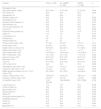Patients with heart failure (HF) and chronic obstructive pulmonary disease (COPD) have a high risk of hospital admission and mortality. This study evaluated the benefit of a care model, characterized by comprehensive and continuous care (UMIPIC program) in patients with HF and a history of COPD.
MethodsA total of 5644 patients were prospectively recruited, of which 1320 had a history of COPD between March 2008 and March 2020. They were divided into 2 follow-up groups at the time of discharge, one in follow-up in the UMIPIC program (435 patients) and another treated conventionally (885 patients). The baseline characteristics of each group were analyzed and patients in each group were selected by propensity score matching and admissions and mortality were evaluated during 12 months of follow-up, after an episode of hospitalization for HF.
ResultsThe UMIPIC group, compared to the conventional group in the matched cohort, had a lower rate of admissions for HF (21% vs 30 respectively; hazard ratio [HR] = 0.64; 95% confidence interval [95% CI]: 0.54–0.84; p = 0.002) and mortality (28% vs 36%, respectively; HR = 0.68; 95% CI: 0.51–0.90; p = 0.008). From a therapeutic point of view, patients with HF and a history of COPD who were followed in the UMIPIC program received a higher percentage of beta-blockers (64% vs 54%; p < 0.05) and direct-acting anticoagulants (17% vs 9%: p < 0.05) than those followed conventionally.
ConclusionsThe implementation of the UMIPIC care program for patients with HF and a history of COPD, based on comprehensive and continuous care, reduces both admissions and mortality at one year of follow-up. The prescription of beta-blockers and direct-acting anticoagulants was also higher during follow-up in the UMIPIC program.
Los pacientes con insuficiencia cardíaca (IC) y enfermedad pulmonar obstructiva crónica (EPOC) presentan un riesgo elevado de ingreso hospitalario y mortalidad. En este estudio se evaluó el beneficio de un modelo asistencial, caracterizado por una atención integral y continuada (programa UMIPIC) en pacientes con IC y antecedentes de EPOC.
MétodosSe reclutaron prospectivamente un total de 5644 pacientes, de los cuales 1320 tuvieron antecedentes de EPOC entre marzo de 2008 y marzo de 2020. Se dividieron en 2 grupos de seguimiento en el momento del alta, uno en seguimiento en el programa UMIPIC (435 pacientes) y otro atendido de forma convencional (885 pacientes). Se analizaron las características basales de cada grupo y se seleccionaron por emparejamiento (propensity score matching) pacientes en cada grupo y se evaluaron los ingresos y la mortalidad durante 12 meses de seguimiento, tras un episodio de hospitalización por IC.
ResultadosEl grupo UMIPIC, con respecto al convencional en la cohorte emparejada, tuvo una menor tasa de ingresos por IC (21% frente a 30 respectivamente; hazard ratio [HR] = 0,64; intervalo de confianza del 95% [IC 95%]: 0,54-0,84; p = 0,002) y de mortalidad (28% frente a 36%, respectivamente; HR = 0,68; IC 95%: 0,51-0,90; p = 0,008). Desde el punto de vista terapéutico los pacientes con IC y antecedentes de EPOC que fueron seguidos en el programa UMIPIC recibieron en mayor porcentaje betabloqueantes (63,9% vs 54,2%; p < 0,05) y de anticoagulantes de acción directa (17% vs 9%: p < 0,05) que los seguidos de forma convencional.
ConclusionesLa implementación del programa asistencial UMIPIC a pacientes con IC y antecedentes de EPOC, basado en una atención integral y continuada, reduce tanto los ingresos como la mortalidad al año de seguimiento. La prescripción de betabloqueantes y anticoagulantes de acción directa también fue mayor durante el seguimiento en el programa UMIPIC.
Article
Diríjase desde aquí a la web de la >>>FESEMI<<< e inicie sesión mediante el formulario que se encuentra en la barra superior, pulsando sobre el candado.

Una vez autentificado, en la misma web de FESEMI, en el menú superior, elija la opción deseada.

>>>FESEMI<<<











